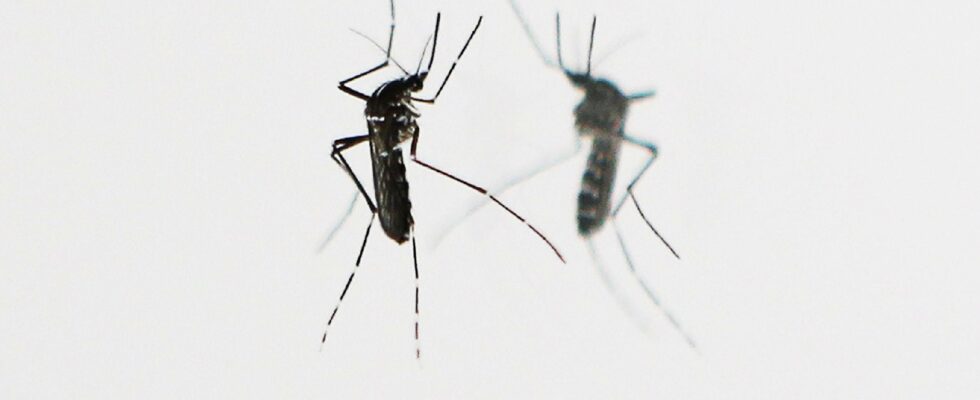Almost all of France is colored red. The number of cases of dengue imported into mainland France, mainly after trips to the Antilles, has already broken the record reached for the whole of 2023, according to data from Public health France published this Wednesday, May 29. From January 1 to April 30, 2024, 2,166 imported cases of dengue were recorded on the continent, compared to 128 on average over the same period the previous five years.
Even before the Paris Olympic Games (July 26 – August 11), which will encourage the mixing of populations in the middle of the tiger mosquito season (vector of viral diseases), the 2023 record for imported dengue cases (2019) was broken in just four months. “The circulation of the dengue virus is greater this year in many countries in Africa and Latin America,” Yannick Simonin, virologist and teacher-researcher at the University of Montpellier, explains to L’Express.
“Dengue or ‘tropical flu’ is a disease transmitted by the bite of an Aedes mosquito carrying one of the four dengue viruses. There is no direct transmission from person to person,” specifies the Ministry of Health on its site. Be careful, the mosquito is not, in itself, a carrier of the virus: it must bite an infected person and then transmit it to another individual. As a reminder, dengue fever is most often benign, but can progress, in around 1% of cases, to a more serious form causing bleeding. Deaths are very rare.
For their part, the health authorities are closely monitoring its development. From May 1 to 28, when diseases linked to the period of activity of mosquito vectors began to be the subject of “reinforced surveillance”, 337 other imported cases of dengue fever were recorded in mainland France. “The previous two years saw the number of indigenous cases of dengue [NDLR : transmis par un moustique présent sur place] increase. In 2024, the circulation of dengue fever should be very intense,” says Yannick Simonin. As of mid-May, no episode of indigenous transmission of dengue fever, but also of chikungunya or Zika, had yet been detected. In 2023, France had identified around fifty indigenous cases of dengue after a record of 66 in 2022.
Aedes albopictus has been established in France since 2004. The virus circulates regularly in the French departments of the Americas (Martinique, Guadeloupe, Guyana), in the French islands of the Pacific and the Indian Ocean. During the first four months of 2024, 82% of cases imported into mainland France were contracted in Martinique or Guadeloupe and 5% in Guyana, “departments where there is a significant epidemic”, noted Public Health France.
Under reinforced surveillance between May and November
In mainland France, dengue fever is now present in almost the entire territory. The tiger mosquito is permanently established in 51 metropolitan departments, again according to the government. Among the most affected regions are Auvergne-Rhône-Alpes and Provence-Alpes-Côte d’Azur – respectively 64 and 53 cases between May 1 and May 28. The risk of indigenous circulation of dengue following the introduction of the virus by a sick traveler is therefore possible. “Ultimately, the tiger mosquito will colonize the entirety of France,” warns Yannick Simonin.
Especially since global warming represents a major ally for this insect which flourishes in hot countries. “The summer periods are getting longer, which also widens the window of activity of the tiger mosquito. For example, the torrential rains of recent days, coupled with high temperatures, favor their hatching,” specifies the expert.
Furthermore, the upcoming organization of the Olympic Games and other major sporting events represents a new boon for the virus. By attracting populations from all over the world, global competition “reinforces the risks of outbreaks of dengue, zika and chikungunya”, indicated the Health Risk Monitoring and Anticipation Committee in a notice published on April 5, 2023. More generally, the organization says it expects “in the years to come an increase in cases of dengue, zika and chikungunya”.
It remains to know how to protect yourself. In addition to basic actions (repellent, wearing long, loose clothing, etc.), residents of at-risk areas can organize themselves. How ? By destroying or drying up potential shelters, which constitute any reserve of stagnant water outside or inside the home. “The best way to fight against mosquitoes is to establish collective and individual surveillance. You must understand that if you are bitten, it is necessarily by a mosquito born nearby, because the insect does not does not travel great distances”, underlines Yannick Simonin. Be careful, therefore, of stagnant water near your home.
